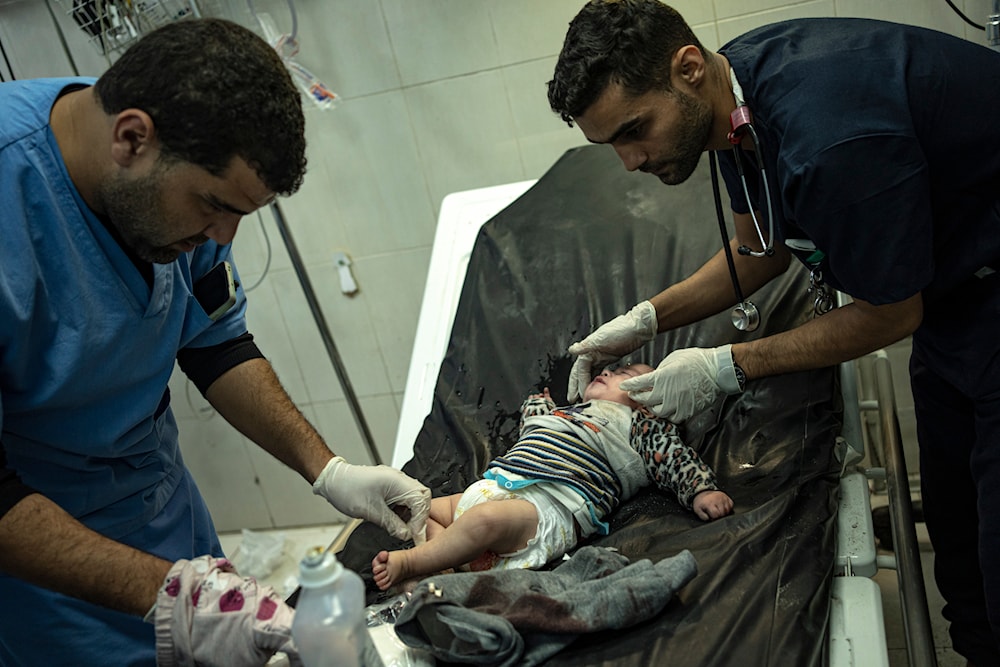Gazans 'not living, they're surviving': MSF
The Medical Coordinator for Palestine with Doctors Without Borders stresses that the situation in Gaza is unparalleled and not like anything she has seen before.
-

A Palestinian baby wounded in the Israeli bombardment of the Gaza Strip is treated in a hospital in Khan Younis, Friday, December 1, 2023. (AP)
Guillemette Thomas serves as the Medical Coordinator for Palestine with Doctors Without Borders (MSF), overseeing the Gaza Strip and the occupied West Bank. Speaking to The Journal from her base in al-Quds, Thomas expressed that the current situation is unparalleled in her experience.
“It’s the first time I’m exposed to such a horrific situation, with such intense violence, and for such a long period,” she says.
Thomas addressed the challenging circumstances faced by internally displaced Palestinians in the Gaza Strip. She also highlighted the ongoing attacks by Israeli occupation forces on hospitals, ambulances, and healthcare workers since the start of the war on Gaza, resulting in over 21,000 Palestinian martyrs and millions displaced.
A complete siege was imposed on Gaza following the launch of Operation Al-Aqsa Flood, with "Israel" cutting off all access to food, water, fuel, and electricity in the already blockaded and impoverished region.
‘They’re not living, they’re surviving’
In MSF's recent report on the situation in Gaza, it was noted that internally displaced Palestinians are enduring harsh conditions, facing "dangerously little levels of food and water." The report highlighted instances where people are resorting to drinking saltwater, and some shelters are equipped with only one toilet for every 600 individuals.
Thomas characterized the conditions as "dire," leading to a notable surge in diseases, infections, and dehydration. She explains that the lack of access to basic amenities like showers and toilets is contributing to the rise in various diseases, particularly diarrhea, and dehydration due to the absence of clean water.
'Infected wounds'
"A high number of people with wounds have infections because they have no way to maintain proper hygiene conditions, no access to healthcare, and even the most basic injuries are becoming infected," explained Thomas.
She added, "Another issue related to the living conditions is the increase in respiratory tract infections, as they are living outside in overcrowded places, which is a factor contributing to these infections, along with skin infections."
#Gaza is grappling with a health emergency exacerbated by cold weather, overcrowded shelters, scarce food, and contaminated water which has resulted in a surge of infectious diseases. The dire situation has overwhelmed hospitals, leaving the sick with limited treatment options.… pic.twitter.com/JY8O5Unwuo
— Al Mayadeen English (@MayadeenEnglish) December 14, 2023
"They're not living; they're surviving. They are enduring the same conditions faced by many displaced people worldwide. What exacerbates the atrocity of this situation is that they have no means to escape the bombing, shelling, and violence, which is unique to this conflict. People are in an exceptionally vulnerable and challenging situation due to living conditions, compounded by the constant violence and threats to their lives," Thomas emphasized.
Hospitals under siege
Since the beginning of the Israeli aggression on Gaza, MSF staff have witnessed direct attacks on hospitals, ambulances, patients, and healthcare workers.
“What I can tell you is that since the beginning of the conflict, what we can see is that the IOF is targeting directly the health facilities, either hospitals or ambulances or other health facilities, which is unacceptable and which is against all humanitarian law,” Thomas says.
“They are doing that regularly. Even now they are doing that in the north of Gaza, surrounding hospitals, targeting the people inside, shooting the people inside.”
#Watch | Medical staff at #AlShifaHospital's intensive care unit evacuate patients after an Israeli strike targeted the unit.#Gaza #GazaGenocide pic.twitter.com/rtdrFVaI2b
— Al Mayadeen English (@MayadeenEnglish) November 15, 2023
Thomas highlights the dire situation in the northern part of Gaza, stating that healthcare facilities in that area are currently unable to receive patients. This is attributed to the facilities being surrounded by Israeli tanks, and a lack of fuel, supplies, and staff, all resulting from the total siege imposed by the occupation around the hospitals. The blockade is severely hindering the ability of healthcare facilities to function and provide essential care to those in need.
After bombings on Sunday of Al-Maghazi and Al-Bureij refugee camps, Al-Aqsa Hospital reported on Monday that they admitted 209 injured and 131 dead, so far. About half of them were women and children.
— Doctors w/o Borders (@MSF_USA) December 26, 2023
MSF doctors and staff are providing trauma wound care for the variety of…
This cannot be alleviated because of the restriction of any access to the north of Gaza, she explains.
In a concerning incident, Thomas reports that Israeli forces "directly targeted" the maternity ward of al-Nasser Hospital in the southern city of Khan Younis, where MSF staff are actively working.
Tragically, a patient, a young girl, lost her life as a result of the aggression. Thomas points out that, throughout the war, Israeli forces have treated hospitals as targets, demonstrating a disregard for humanitarian laws.

 4 Min Read
4 Min Read








